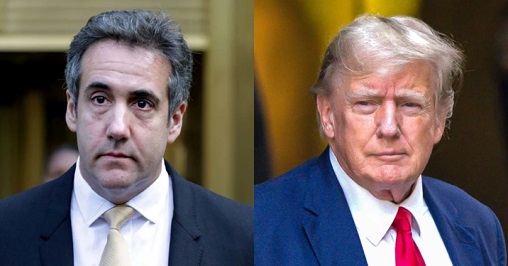Donald Trump's historic hush-money trial edged closer to its conclusion on Tuesday as the prosecution and defence made their closing arguments to the court.
In the defence's final pitch, Mr Trump's lead lawyer attacked Michael Cohen - his former fixer and the prosecution's star witness - as the "greatest liar of all time".
Prosecutors then launched into a lengthy rebuttal, portraying Cohen as a flawed "tour guide" to a "mountain" of evidence against Mr Trump.
Twelve jurors will soon be asked to decide if the former president, and presumptive Republican nominee for November's election, is guilty beyond reasonable doubt of falsifying business records.
Over the past six weeks, Mr Trump, 77, has sat through days of testimony regarding a hush-money payment made before the 2016 election to Stormy Daniels, a former adult-film star, in exchange for her silence over an alleged sexual encounter.
Prosecutors with the Manhattan District Attorney's Office claim Mr Trump falsified business records on 34 counts when he reimbursed Cohen for the $130,000 (£102,000) payment and recorded it as legal fees.
They have further claimed he was motivated by an intent to unlawfully influence the 2016 race.
Over several hours on Tuesday, Mr Trump's lawyer Todd Blanche argued passionately that Mr Trump had no intention of either falsifying business records or committing election interference.
He attacked the credibility of Cohen, who he called the "human embodiment of reasonable doubt".
Mr Blanche reminded jurors that Cohen had been jailed for lying under oath, that he had acknowledged stealing from his former employer and that he now lived with "an axe to grind" against Mr Trump.
“He's literally like an MVP of liars," he said.
Mr Trump swivelled in his chair and watched as his attorney railed against the case, occasionally closing his eyes as he has often been seen to do.
But the burden of proof in this case lies with the prosecution, who must convince jurors of Mr Trump’s guilt beyond a reasonable doubt to secure a conviction.
Lead counsel for the prosecution Joshua Steinglass took a nearly four-hour route through his closing argument, finally wrapping at around 20:00 local time at the behest of Justice Juan Merchan.
At its core, the case against Mr Trump is about “a conspiracy and a cover-up", he said.
Over five weeks, the prosecution has called a host of witnesses to corroborate dozens of documents and recordings surrounding the hush-money payment to Ms Daniels and the reimbursement to Cohen..
Mr Steinglass acknowledged the problems with some witnesses, including "cringeworthy" testimony from Ms Daniels as well as the considerable "baggage" of their star witness.
"The defendant chose Michael Cohen. To be his fixer!" he pointed out. "We didn't pick him up at the witness store."
Mr Steinglass said the jury must consider “not whether you like Cohen or whether you want to go into business” with him, but view him instead as a "tour guide" to evidence that his actions helped "one person and one person only".
If jurors "ignore the sideshows," he added, they will find Mr Trump guilty.
Some legal experts say it will be no easy feat to persuade jurors of the broader theory: that Mr Trump falsified business records with the intent to cover up another crime, unlawfully influencing the 2016 election.
Others said the prosecution may have taken too long to make its final points.
“Lawyers love to talk, but less is more in a case like this,” former federal prosecutor Neama Rahmani told the BBC.
The panel of 12 New York jurors will weigh Mr Trump’s legal fate and must unanimously agree to convict or acquit him. If they cannot agree on a verdict, the case will move to a mistrial.
BBC





